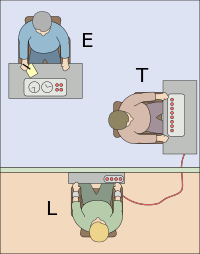
Photo from wikipedia
Evaluative learning comprises changes in preferences after co-occurrences between conditioned stimuli (CSs) and an unconditioned stimulus (US) of affective value. Co-occurrences may involve relational responding. Two experiments examined the impact… Click to show full abstract
Evaluative learning comprises changes in preferences after co-occurrences between conditioned stimuli (CSs) and an unconditioned stimulus (US) of affective value. Co-occurrences may involve relational responding. Two experiments examined the impact of arbitrary relational responding on evaluative preferences for hypothetical money and shock outcomes. In Experiment 1, participants were trained to make arbitrary relational responses by placing CSs of the same size but different colours into boxes and were then instructed that these CSs represented different intensities of hypothetical USs (money or shock). Liking ratings of the CSs were altered in accordance with the underlying bigger/smaller than relations. A reversal of preference was also observed: the CS associated with the smallest hypothetical shock was rated more positively than the CS associated with the smallest amount of hypothetical money. In Experiment 2, procedures from Relational Frame Theory (RFT) established a relational network of more than/less than relations consisting of five CSs (A-B-C-D-E). Overall, evaluative preferences were altered, but not reversed, depending on (a) how stimuli had been related to one another during the learning phase and (b) whether those stimuli referred to money or shocks. The contribution of RFT to evaluative learning research is discussed.
Journal Title: Quarterly Journal of Experimental Psychology
Year Published: 2017
Link to full text (if available)
Share on Social Media: Sign Up to like & get
recommendations!